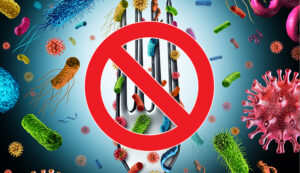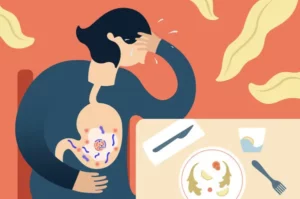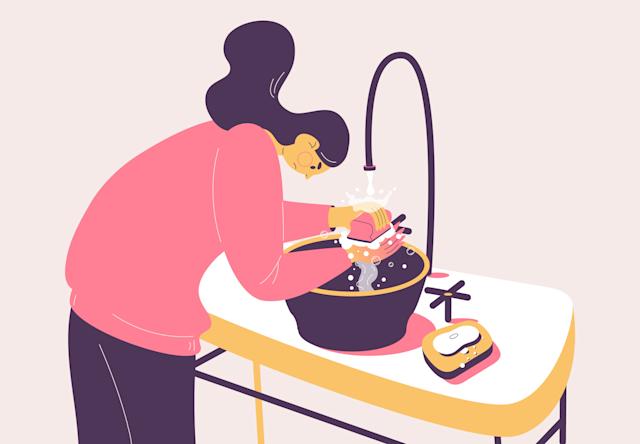Do you have OCD? If so, you may be familiar with the fear of contamination. This is one of the most common symptoms of OCD and can be quite scary. It often leads people to avoid contact with others and to obsess over germs and bacteria. In this blog post, we will discuss the fear of food contamination and its links to OCD. We will also offer some tips for coping with this fear.
Contents
What Is Food Contamination In OCD?

OCD, also popular by the name of Obsessive-Compulsive Disorder is a mental health disorder that involves intrusive and unwanted thoughts, feelings, or images that are disruptive and cause distress. People with OCD often have very strict routines and rituals that they feel compelled to follow in order to avoid their feared objects or situations.
For some people with OCD, the fear of contamination is a very real and debilitating fear. Infact, contamination OCD is one of the most known and prevalent subtypes of OCD. People with contamination OCD often obsess over germs, bacteria, and other contaminants. They may fear that they will contract a disease or illness if they come into contact with contaminated surfaces or objects. They may also worry that they will contaminate others if they do not follow their strict rituals and routines.
When we particularly talk about food contamination OCD, this means that people have obsessions and intrusive thoughts surrounding food and the fear of becoming sick from eating contaminated food. This can be a very distressing and debilitating fear as it can make it hard for people to eat and enjoy meals. It can also make it difficult to go out in public or to eat at restaurants.
It is important to note that food contamination OCD is not the same as having food allergies or sensitivities. People with food contamination OCD do not have a physical reaction to the foods that they are afraid of. Instead, their fear is entirely psychological.
What Are The Symptoms Of Food Contamination OCD?
The symptoms of food contamination OCD can vary from person to person. However, there are some common symptoms that many people with this OCD subtype experience. These include:

- Obsessions about food contamination and becoming sick from eating contaminated food
- Intrusive thoughts and images about food contamination
- Avoidance of certain foods or restaurants for fear of becoming sick
- Excessive hand washing or sanitizing after coming into contact with food
- Strict rituals and routines surrounding food preparation and eating
- Checking and re-checking food for contamination
- Fear of becoming sick from eating contaminated food
- Avoidance of certain foods or restaurants
- Difficulty eating in front of others for fear of vomiting
- Extreme anxiety about food preparation and cooking
- Avoidance of public places for fear of coming into contact with contaminated surfaces
These are some of the most prominent tell-all signs that someone may have food contamination OCD. It is important to keep in mind that not everyone with this OCD subtype will experience all of these symptoms. Some people may only have a few, while others may have many. The symptoms may also vary in intensity, frequency, as well as how much they interfere with daily life.
What Are The Causes?
There is no one specific cause of food contamination OCD. Instead, it is thought to be caused by a combination of factors. Some of the most observed possible causes include:

- Genetics: Some research suggests that OCD may be partially hereditary. This means that if you havea close family member with OCD, you may be more likely to develop the disorder yourself.
- Brain Structure and Functioning: There is some evidence to suggest that people with OCD may have differences in the way their brains are structured and how they function. This can also mean that certain areas of the brain may be more active than others.
- Environment: Experiencing trauma or stressful life events can also be a trigger for OCD. This is because these experiences can lead to an increase in anxiety and fear, which can then trigger obsessive thoughts and compulsions.
- Over-indulgence in compulsions: In some cases, people with OCD may engage in their compulsions so much that it actually makes their symptoms worse. This is because the more they do their compulsions, the more they reinforce their fears and anxieties.
- Need for control: People with OCD may also have a need for control. This means that they may feel the need to control their environment in order to reduce their anxiety.
- Traumatic incidents: If you have been through a traumatic experience, you may be more likely to develop OCD. This is because trauma can lead to an increase in anxiety and fear, which can then trigger obsessive thoughts and compulsions.
It is important to keep in mind that these are only some of the possible causes of food contamination OCD. There is still much research that needs to be done in order to fully understand the causes of this disorder.
How Is It Diagnosed?
If you think you or someone you know may have food contamination OCD, it is important to seek professional help. This is because OCD can be a very debilitating disorder that can interfere with daily life. The first step in getting help is to schedule an appointment with a mental health professional. They will then conduct a thorough evaluation to rule out any other possible causes of the symptoms. Once other conditions have been ruled out, a diagnosis of OCD can be made.
The diagnosis is made on the basis of the symptoms that are present. The mental health professional will also ask about the thoughts, fears, and behaviors that are associated with the symptoms. They will also ask about how much the symptoms interfere with daily life. The DSM-5, popularly known as the Diagnostic and Statistical Manual of Mental Disorders, Fifth Edition, is the most commonly used manual for diagnosing mental disorders. It outlines the symptoms that need to be present in order for a diagnosis of OCD to be made.
How Does It Affect Life?
While food contamination OCD may seem harmless from the surface, it is a very serious and debilitating disorder. It can have effects on multiple spheres of life. For example:
- People with this disorder may avoid eating certain foods or going to certain places for fear of contamination. This can lead to problems such as malnutrition, weight loss, and social isolation. If left unchecked, it can also make an individual prone to eating disorder.
- It can also lead to problems at work or school. This is because people with this disorder may have difficulty concentrating on tasks or may take longer to complete them.
- It can also affect relationships. This is because the person with OCD may avoid social situations for fear of contamination.
- OCD can also lead to financial problems. This is because one may be too involved in cooking everything from scratch or buying special cleaning supplies.
- They may also have difficulty maintaining personal as well as professional ties due to their need for control. This is because they may start to obsessively clean or check things in order to reduce their anxiety.
All of these factors can lead to a decline in the quality of life. It is important to seek professional help if you think you or someone you know may have food contamination OCD.
What Are Some Ways To Manage It?
There are many different treatment options available for OCD, and the most effective one will vary from person to person. While some people may be able to manage themselves by adapting to self-care, others may need a more elaborate and intensive approach to treatment.
Professional Help
Professional help involves sitting with a mental health professional to talk about your thoughts, fears, and behaviors. They will work with you to develop a treatment plan that is tailored to your needs. This may involve medication, therapy, or a combination of both.
There are many different types of medications that can be used to treat OCD. The most commonly prescribed ones are antidepressants, which help to regulate the chemicals in the brain. Some examples include selective serotonin reuptake inhibitors (SSRIs), clomipramine, and fluoxetine.
There are many therapeutic approaches that can be helpful in understanding, assessing, and treating OCD. The most common ones are:
- Cognitive-behavioral therapy: CBT is one of the most effective forms of therapy for OCD. It involves learning to identify and challenge the thoughts that are causing anxiety. This can help to reduce the symptoms of OCD. It also teaches people how to change their thinking and behavior in order to reduce their anxiety.
- Exposure and response prevention: Also famous by its acronym ERP, is a type of CBT that has been proven to be effective in the treatment of OCD. It involves gradually exposing oneself to the things that trigger anxiety and learning how to control the urge to perform compulsive behaviors. For someone with food contamination OCD, ERP may look like exposure to different types of food and learning how to control the urge to wash hands excessively.
- Psychodynamic therapy: This is a type of therapy that focuses on understanding the unconscious thoughts and emotions that are causing OCD. It can help people to understand their compulsions and learn how to control them.
- Acceptance and commitment therapy: ACT is a newer type of therapy that focuses on helping people to accept their thoughts and feelings without trying to change them. It also helps people to commit to taking action in spite of their anxiety.
- Family-based therapy: As the name suggests, this is a type of therapy that involves the whole family. It can help families to understand OCD and how to support their loved ones who are struggling with it.
- Support groups: There are many different types of support groups available for people with OCD. These can provide a place to share experiences, learn from others, and receive support.
OCD can be a difficult disorder to live with, but there are many ways to manage it. If you think you can benefit from professional help, do speak to a therapist or qualified mental health professional. There are also many resources available online and in your local community that can offer support and guidance.
Self-Help

Self-help can be one of the most effective and liberating ways to manage your OCD. It can involve learning about the disorder, challenging your thoughts, and changing your behavior.
- One of the most important things you can do is to educate yourself about OCD. The more you know about the condition, the less power it will have over you. There are many books, articles, and websites that can provide information and support.
- You can also challenge your thoughts by asking yourself if they are really true. Are you really in danger of getting sick if you don’t wash your hands? Can you really control whether or not someone dies? Once you start to question your thoughts, they will begin to lose their power over you.
- Maintaining a journal to document your OCD thoughts and behaviors can also be helpful. This can help you to track your progress and see how far you have come.
- Altering your lifestyle in order to reduce stress can also be helpful. This may involve things like exercise, relaxation techniques, and healthy eating.Making some simple changes in your behavior can also be effective. For example, if you are compulsively checking the calories or ingredients in your food, try to eat without looking at them. If you are washing your hands excessively, try to set a limit on how many times you do it.
Experiencing OCD can be very difficult and isolating. However, there are many people who understand what you are going through and can offer support. There are also many resources available that can aid your journey towards healing.
Conclusion
In conclusion of the above, food contamination OCD is a scary reality for many people. However, there are ways to manage it and live a normal life. If you think you may have OCD, do speak to a qualified mental health professional. There is also a wealth of information and support available online and in your local community. With help, you can learn to control your OCD and lead a fulfilling life.
If you or someone you know is struggling with OCD, please reach out to Therapy Mantra for help. We have a team of highly qualified mental health professionals who can provide you with the treatment and support you need. Contact us today to book an online therapy session or download our free OCD treatment app on Android or iOS for more information.


